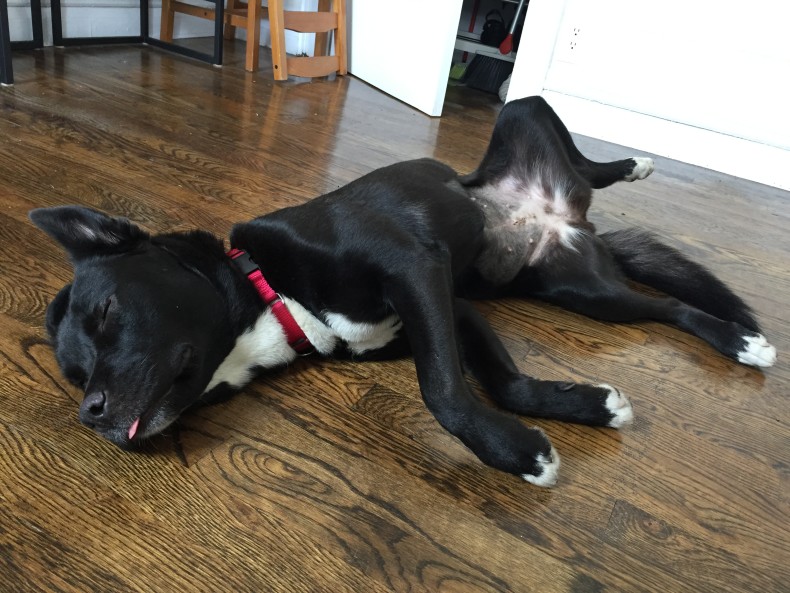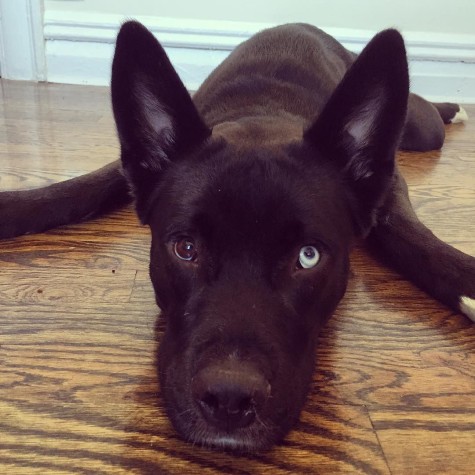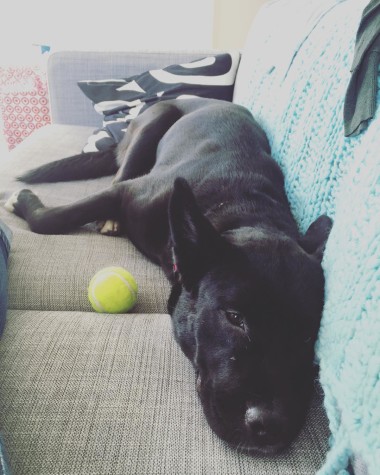
When I first published this post, we had just brought home our adopted pupper Moro. Now, we’ve had her for over two years, and when people come over they compliment how well trained she is. (Sometimes people think she’s a service dog, because we make her carry our groceries in a little backpack, because we are lazy and it tires her out.) It’s taken many, many hours of training and help from experts to get to this point, but Moro never barks and can run around off leash without a problem now. No more puppy blues for me! But if you got a Christmas puppy, and you’re now realizing oh my god you have a puppy what the hell are you supposed to do with it, this post is for you.
__
Anybody who knows me at all, in any context, probably knows that I adopted a dog two weeks ago. It’s all I talk about all the time. Sources know that she might try to get in my lap during an interview. Friends know that they’re invited over any time to see her and teach her how to play nice. My family knows because I already brag about how much better behaved she is than their dogs.
What they probably don’t know is that for a few days in a row last week I came home from running errands and sat on my floor and cried.
A few days after we brought Moro home a friend of mine warned me: “Beware of post-puppy depression.” I didn’t really know what she meant. Dogs are great. I love dogs. I’ve been talking about getting a dog for over a year. And now I had found the perfect pup and she was ours. What could possibly go wrong?
But talking about getting a dog, and actually getting a dog, it turns out, are different. Duh, you are probably thinking. Well yeah, duh, but there are all sorts of things that you think you know, but you don’t really understand until you do them. (Fellow LWON’er and dog haver Cassie has learned this too.)
We knew she would need training and a routine and a lot of exercise. But there’s a difference between knowing all of that, and suddenly having a small monster in your house that pees on the floor and never seems to get tired and pulls your arm off if she sees another dog that she wants to play with.
But even then, all that I could deal with. Then she started barking. The pup hadn’t made a peep for over a week, and suddenly she was barking. At people, at dogs, at nothingness. And her bark is big. It’s scary. People jump away when they hear it, which is honestly an appropriate reaction. She’s incredibly friendly, but they don’t know that. They see a big black dog and hear a deep full bark. I would probably shy away too.
I could handle pee, I could handle a puller, I could handle her endless energy. But I couldn’t handle the barking. All the feelings of fear and inadequacy I had suppressed in the first week, all the doubts about our ability to have a dog, about the size of our apartment, our lack of yard, our schedules, our readiness to train a small beast, came up at once.
That afternoon I went to the store to get more dog treats for training, and on my way back, when I started thinking about taking her out of her crate and down the stairs for a walk, I started to panic. What if she barked at someone? What made us think we could handle this animal? Why didn’t we pick a calmer dog? What the hell are we doing? When I got home I avoided her gaze and sat on the floor in the kitchen and cried.
I don’t mean to diminish postpartum depression, which is a very real and very serious thing that I have never experienced and cannot truly understand. And I don’t mean to say that my puppy woes are that bad. But I do wish that someone had told me about post-puppy blues before I got a puppy. It wouldn’t have changed my decision to get one, but it might have helped me avoid crying on the floor of the kitchen and then feeling very dumb about it.

It turns out that there is little scientific literature out there on how humans adapt to the early post-adoption days. One study that looked at dogs returned to a shelter found that most of the reasons animals were given back were behavioral problems that the adopter didn’t know about until they got the pup home. But it didn’t address the kind of human anxiety that my friend described and that I’ve been feeling. Another study tried to gather “owner experiences of the first month post-adoption” but it focused on the dog’s behavioral problems and not the owner’s. So I decided to do what I normally do when I have a question, and ask people. I put out a call on Twitter for folks who had adopted a dog, to see if they had thoughts, and boy did they. It turns out I am not alone in the “crying alone on the floor” reaction to a new dog. All told over 20 people sent me their pup stories. Here’s an abridged version of some of the advice I got from dog owners via email and Twitter DM’s.
Jennifer Stone described our drive home with Moro pretty well: “On the way home from picking up the pup, I started thinking of all the downsides – the things that had made it hard to go for it again: the chewing, the getting into things, the eternal, infernal poop-picking-up. Honestly, by the time we got home, I was almost hyperventilating.”
“The day we got our dog, she was sitting on the floor barking at nothing and we had a very brief but fairly serious ‘we can’t give this back, right?’ conversation, and for a good 4-6 months or so afterward, I would have told you ‘I love Trudy, but we should not have a dog.’” said Seth Rosenthal.
”When my dog’s foster family first dropped her off, the first thing I did was cry for like an hour while she sat next to me, bewildered. I just felt overwhelmed and scared to be responsible for this little creature’s life,” said Allegra Ringo. (Ringo is the cohost of a podcast about dogs called Can I Pet Your Dog which I highly recommend.) “My dog (who wasn’t a puppy, I adopted her at about 3-4 years old) would have accidents in my apartment and I would just cry,” Stephanie said.
For other people the anxiety didn’t hit until a little bit later. “It was maybe a week or so after we got Shadow that we had that “What did we do?” period,” Erin Palmer told me. “Super stressful for me and my partner, there were fights and tears.”
The vast majority of the responses I got were just like these. A few people did say that they never experienced this kind of freak out, and to those people I say: more dogs for you.

And for the rest of us, it’s all going to be okay. Though tales of crying were common, everybody who offered thoughts also said that it got better. Ringo said that a routine is what helped her get over the initial puppy-shock. “For me, it breaks dog ownership down into baby steps every day. Like you don’t have to think “today I am responsible for the life of this dog.” You just think “ok, it’s morning, that means we go outside for her to use the bathroom,” she said. Stephanie said it took her about five months to “adjust to her and let myself love her fully.” Rosenthal, whose pup Trudy wouldn’t stop barking, said his uncertainty faded with time. “Now I can’t imagine living without her.”
We’re still learning how to handle Moro, and she’s still learning what we want from her. But she hasn’t barked at anybody in a week, and she’s learning how to run next to me on the leash to get some of her endless energy out. Soon I’m sure I’ll find something else to be anxious about. And if your dog wants to come over and play, Moro would love nothing more.